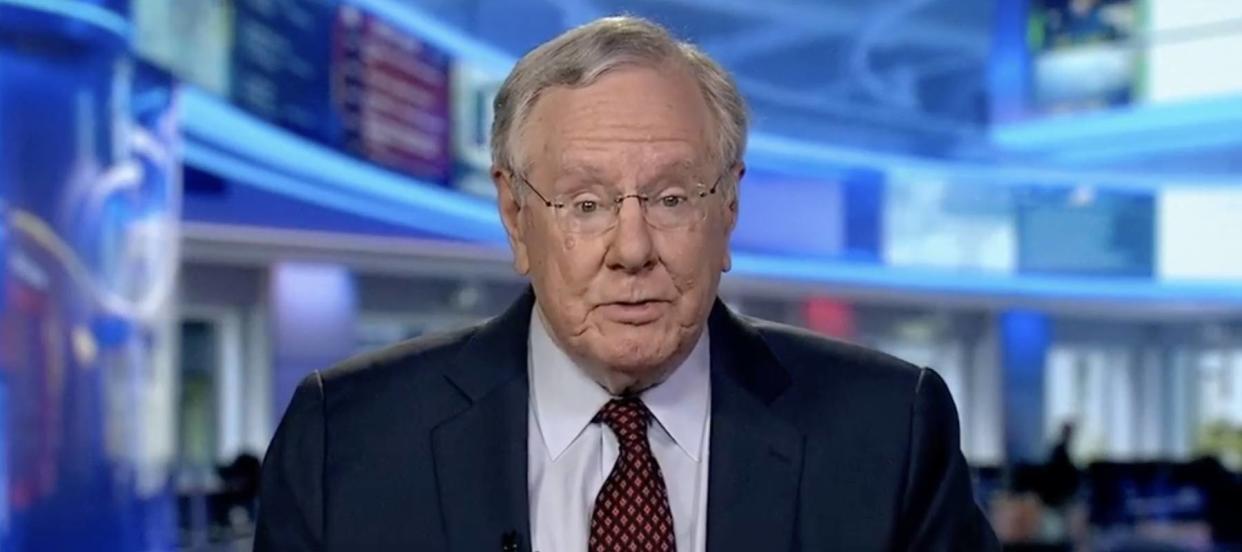‘You’re going to pay for it’: Steve Forbes says declaring a climate emergency would ‘wreck’ the U.S. economy — and Americans will suffer through higher energy prices

Declaring a national climate emergency would “wreck” the U.S. economy, according to Forbes Media chairman and editor-in-chief Steve Forbes.
The two-time Republican presidential candidate was responding to rumors that top advisers to President Joe Biden have resumed talks about invoking a climate emergency — a significant move that would unlock federal powers to curtail oil development.
Don't miss
Commercial real estate has beaten the stock market for 25 years — but only the super rich could buy in. Here's how even ordinary investors can become the landlord of Walmart, Whole Foods or Kroger
Cost-of-living in America is still out of control — use these 3 'real assets' to protect your wealth today, no matter what the US Fed does or says
These 5 magic money moves will boost you up America's net worth ladder in 2024 — and you can complete each step within minutes. Here's how
“You’re going to pay for it with an even more troubled economy,” the 76-year-old said on Fox Business’ The Evening Edit — adding that Americans will suffer the consequences of “higher energy prices.”
Is he right to criticize a potential climate proclamation?
Energy bills
Rumors that an emergency climate proclamation could be used to halt crude exports and suspend offshore drilling started to resurface in mid-April.
When Bloomberg poked the White House for confirmation that the Biden administration is considering such a move, spokesperson Angelo Fernández Hernández declined to comment specifically on any internal discussions.
Instead, Hernández said: “President Biden has treated the climate crisis as an emergency since day one and will continue to build a clean energy future that lowers utility bills, creates good-paying union jobs, makes our economy the envy of the world and prioritizes communities that for too long have been left behind.”
In contrast, Forbes scoffed at the idea that forcing the nation off fossil fuels would reduce Americans’ energy bills.
“Just look at Europe,” he said. “Germany has two to three times the electricity costs than the U.S. because of the kinds of stuff the Biden administration is doing now. They’ve learned a hard lesson.”
According to Statista analysis, German households paid 40 cents (USD) per kilowatt-hour in September 2023, compared to U.S. households at 17 cents. The data shows that countries who rely heavily on fossil fuel imports for electricity generation are more vulnerable to market price fluctuations.
Read more: 'Baby boomers bust': Robert Kiyosaki warns that older Americans will get crushed in the 'biggest bubble in history' — 3 shockproof assets for instant insurance now
A political move
White House advisers in favor of a climate emergency declaration think such a move could garner favor with climate-conscious voters — specifically younger Americans.
Aru Shiney-Ajay, executive director of the Sunrise Movement — a political action organization for young people fighting to stop the climate crisis — told Bloomberg: “If Biden wants to win the youth vote, he needs to take forceful action on climate change.”
But Forbes accused the Biden administration of “throwing all sensible policies away” to try and win the election. He added: “I think young people will see… through it … [there’s] a lot of verbiage that’s going to end up doing them harm.”
He specifically called out some “contradictions” in Washington’s climate directives. For example, the Biden administration introduced new tailpipe pollution limits in March that would ensure that, by 2032, more than half the new cars sold in the U.S. would most likely be zero-emissions vehicles.
But just last week, the administration rejected re-approval of the Ambler Access Project (AAP) in Alaska, denying copper development and other mineral mining, which Forbes believes is critical for the U.S. economy.
“If you are serious about EVs, you need more copper. If you’re serious about high tech, you need more copper for electricity. So, the whole thing is full of contradictions,” Forbes said. “It’s ending up doing harm and creating uncertainty — and you don’t get long-term investment, which is the only way to really get this economy going.”
What to read next
Jeff Bezos and Oprah Winfrey invest in this asset to keep their wealth safe — you may want to do the same in 2024
'It's not taxed at all': Warren Buffett shares the 'best investment' you can make when battling rising costs — take advantage today
Car insurance premiums in America are through the roof — and only getting worse. But 5 minutes could have you paying as little as $29/month
This article provides information only and should not be construed as advice. It is provided without warranty of any kind.
